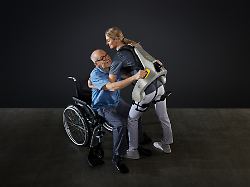Smart power suits
Exoskeletons are intended to relieve nursing staff
06/02/2023 09:49 am
Nursing staff in robotic suits: An Augsburg start-up is developing an exoskeleton specifically for the challenges of everyday hospital work. The assistance system relieves the musculoskeletal system, helps with lifting and is intended to make work on the patient easier.
The working conditions in certain nursing professions are to be improved in the future through the use of robotic suits, so-called exoskeletons. The robotics company German Bionic announced the first active exoskeleton specifically for use in care. The system that people wear on their bodies is intended to provide support when lifting and thus protect against overload and injuries.
So far, the power suits have mainly been used to lift and move heavy objects in industry, trade, in logistics companies or for sorting luggage at airports. The Bundeswehr is also currently testing the use of exoskeletons to refuel aircraft at the air base in Wunstorf, Lower Saxony.
With exoskeletons, a distinction is made between passive and active systems. Systems in the industrial environment mostly work passively. They have springs or expanders that are under mechanical tension and release their energy again with certain postures. However, the new system from German Bionic is an active system that is electrically operated.
“Smart companion in clinics and nursing homes”
The start-up from Augsburg and Berlin had already received the “Best of Innovation” award for its exoskeleton called “Cray X” at the world’s largest electronics trade fair CES in Las Vegas in January. The new device “Apogee+” for the care sector is to be presented to the public for the first time in mid-June at the VivaTech 2023 trade fair in Paris.
The innovative power suit should help to make the sometimes very stressful working conditions in these system-critical professions easier and to make them healthier and more sustainable, said Armin G. Schmidt, boss and founder of German Bionic. “We are convinced that the smart companions will soon be part of everyday life in clinics and nursing homes.”
Working in hospitals and care facilities is associated with high physical stress for many caregivers, which can lead to early retirement, said Schmidt. The new power suit was specially developed to support nursing staff in their everyday work. The exoskeleton also meets specific requirements for the healthcare sector. For example, it can be easily disinfected and has handles for the patients.
German Bionic has its headquarters in Germany and the USA, with offices in Berlin, Boston, Augsburg and Tokyo. The company currently employs almost 100 people.
